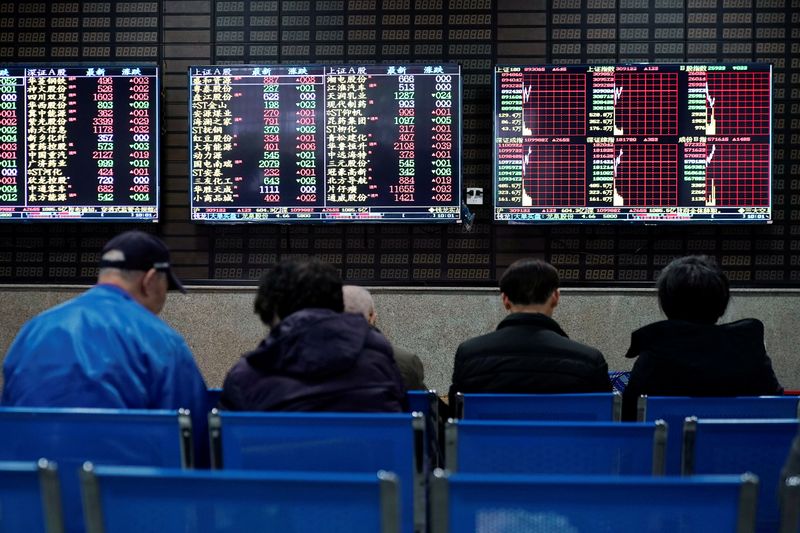This post was originally published on this site
https://i-invdn-com.akamaized.net/trkd-images/LYNXMPEG1G010_L.jpg
By Swati Pandey
SYDNEY (Reuters) – Asian shares reversed losses on Monday and moved back toward a three-week top as China’s persistent efforts to cushion the blow from a coronavirus outbreak calmed nervous investors, although Japanese stocks faltered on growing recession risks.
Trading is expected to be light as U.S. stocks and bond markets will be shut on Monday for a public holiday.
Reinforcing a slightly improving market mood, the pan-region rose 0.3% in early European trades, German climbed 0.4% while London’s futures added 0.2%. E-Mini futures for the S&P500 were up 0.3%.
MSCI’s broadest index of Asia-Pacific shares outside Japan advanced 0.3% to be within kissing distance of last week’s peak of 558.30, which was the highest since late January.
The gains were helped largely by Chinese shares with the blue-chip index there jumping 2% after the country’s central bank lowered one of its key interest rates and injected more liquidity into the system.
Also whetting risk appetite was an announcement by China’s Finance Minister on Sunday that Beijing would roll out targeted and phased tax and fee cuts.
Fears about the jolt to the world economy from the coronavirus still lingered though as the number of reported new cases in China rose to 2,048 as on Sunday from 2,009 the previous day.
Restrictions were tightened further in Hubei over the weekend with most vehicles banned from the roads and companies told to stay shut until further notice.
China’s “containment measures suggest that activity is only likely to normalize by mid-March at best and more likely end Q1,” said Jefferies analyst Sean Darby.
“The question remains over the degree of stimulus to be required given the country’s fiscal position.”
Japan’s stumbled 0.7% after the country’s economy shrank at the fastest pace in almost six years in the December quarter.
The hit to the world’s third-largest economy comes amid fresh concerns about weakness in the current quarter, as the coronavirus damages output and tourism, stoking fears Japan may slump into a recession.
Trade-dependent Singapore downgraded its 2020 economic growth forecast due to the coronavirus, while China’s economy is also widely expected to take a sharp hit.
BULL RUN
South Korea’s index ended mostly flat while Australian, Singapore and Malaysian share indexes were a tad weaker.
Asia’s woes have yet to spread to the United States, with Wall Street indexes scaling record highs.
Talk of a U.S. middle class tax cut and a proposal to encourage everyday Americans to invest in the equities market boosted share market sentiment late last week, Betashares chief economist David Bassanese said.
Bassanese had misgivings about the plan, saying it reminded him of former U.S. President George Bush encouraging Americans to buy a home during a housing boom.
“It adds to my suspicion that this decade-long bull market could eventually end via a blow-off bubble, driven by central bank persistent low interest rate policy,” he said in a note.
Later in the week, flash manufacturing activity data for February are due for the Eurozone, the United Kingdom and the United States, which is likely to capture at least some of the early impact of the viral epidemic.
Action was relatively muted in the currency markets, with the dollar a touch firmer against the yen at 109.84. It was unchanged on the pound at $1.3043 and slightly weaker on the euro at $1.0837.
The risk-sensitive , which is also played as a liquid proxy for Chinese assets, ticked up 0.2% to $0.6729.
That left the flat at 99.141.
In commodities, gold inched lower to $1,581.50 an ounce.
Oil futures were mixed with flat at $57.32 a barrel and adding 9 cents to $52.14.

